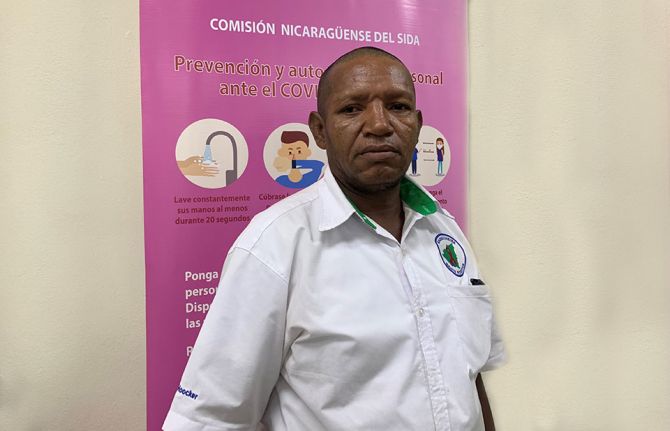
Feature Story
No one should be left behind: Innovations in partnerships for a more equitable AIDS response
23 July 2012
23 July 2012 23 July 2012
Luiz Loures, Director of Political and Public Affairs, UNAIDS, and Sir Elton John at an AIDS 2012 session exploring the role of innovative partnerships in creating a more equitable HIV response, Washington, DC, 23 July. Credit: UNAIDS/C. Kleponis
While the AIDS response has been one of the most successful global health campaigns in history and a fearless proponent of social transformation, access to progress has not been equal.
The reality is that to end AIDS we will need to meet the demands of equity and social justice. Speakers at a special session at the XIX International AIDS conference shared experiences of how innovation in partnerships can deliver stronger, more effective responses.
Kick-starting the discussion, Luiz Loures, Director of Political and Public Affairs Branch of UNAIDS said, “The future we want will take inspiration.” Urging the crowd to create new partnerships Dr Loures added, “We now have the conditions for a revolution to take us to the end—a global revolution to end AIDS.”
Elton John brought to the discussion a deeply personal voice that resonated throughout the session. Drawing from his decades of experience as a powerful AIDS activist, Sir Elton spoke about the critical role of partnerships within and beyond the AIDS response.
Science can help stop the disease, but science alone cannot stop the disease. We must celebrate people who show compassion and people who are on treatment.
Elton John
Urging pragmatism in working with powerful institutions that can create real change (though may not always be sympathetic to the AIDS response), commitment to aligning investments and programmes to the evidence and holism in addressing the interconnected needs of people, he called for creative, innovative and compassionate partnerships to end AIDS. He called for “love”. “Everyone deserves compassion, everyone deserves dignity, everyone deserves respect. And everyone, everyone requires love. The gift of love from the community you live in is the best gift you can have.”
Striking a personal note Sir Elton said, “I should not be here today. I should have been dead like Freddie Mercury or Rock Hudson.” He described how the “love” of his community and of compassionate health workers transformed his life
“The disease is caused by HIV, but the AIDS epidemic is caused by stigma, misinformation and indifference, not the virus,” said Sir Elton. “Science can help stop the disease, but science alone cannot stop the disease We must celebrate people who show compassion and people who are on treatment.”
Fareed Abdullah, the new Chief Executive Officer of the South African National AIDS Council talked about new and emerging opportunities for African responses to access investments, expertise and technical support. “We bring all sectors in the National AIDS Council together, not to control but because we have to work together,” Dr Abdullah said. “In our council, the member of LGBT community has the same status as the Deputy President of the country. This is because we have to hear the community voices if we have to reach services to them.”
Speaking on the importance of funding civil society Fareed Abdullah called for governments to put money in social movement or they will miss the bus in the journey to end AIDS.

Luiz Loures, Director of Political and Public Affairs, UNAIDS, moderates an AIDS 2012 session on innovative partnerships in the HIV response, Washington, DC, 23 July. Credit: UNAIDS/C. Kleponis
Calling for the continued involvement of the Donors, the former Vice-President of Spain Elena Salgado emphasized three pillars of a new international cooperation framework. First she called for “smart money”—investments that allocated effectively and as traditional resources revenue base shrink, find innovate ways such as the financial transactional tax, taxing mobile phone use etc to bridge the investment gap. Second, she called for mutual accountability. “Not the classic accountability of stopping corruption and demanding effectiveness, but social accountability,” Ms Salgado said. “Accountability in which resources are available so that no one is left behind—especially the marginalized.” And lastly she called for efficient law enforcement.
Speaking on the role of the private sector, John Megrue of the Business Leadership Council said that the private sector is committed to ending AIDS. “We will begin with ending new HIV infections among children. The private sector understands this easily, but this just an entry point for our engagement in global health,” said Mr Megrue.
A popular news personality,with more than a million on-line followers in China, James Chau, about how social media was changing the global landscape, especially for young people. The China Central Television (CCTV) presenter warned that millions were still unconnected. “Social media gives us a voice, and gives us new ideas. But it must work together with ground action,” said Mr Chau. “Social change for AIDS is about combining different effective tool for social media to simple campaigns. We need to focus on reliable tools that are around you and build your programme around it.”
In the closing, Dr Loures asked “How do we go forward?” Sir Elton’s reply: “To succeed you have to have a vision and a plan. There is more love in the world than hate.”



